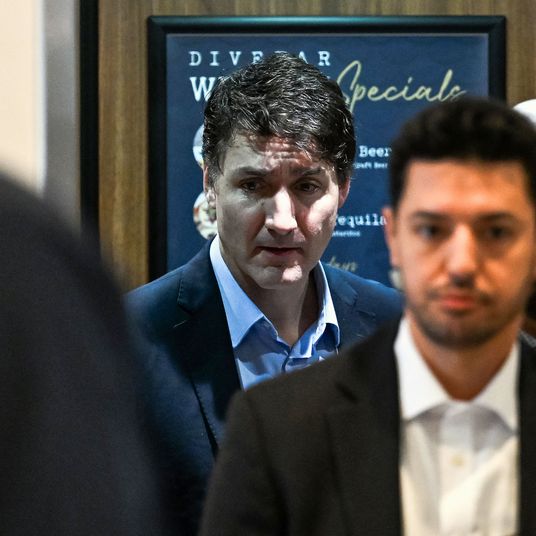
This article was featured in One Great Story, New York’s reading recommendation newsletter. Sign up here to get it nightly.
Those expecting a continuation of Donald Trump’s first term are in for a shock. Back then, he came to office with no experience governing and no understanding of the machinery through which he could implement his will. Over time, he learned and then spent the next four years stewing in resentment and plotting revenge. “In the first term, things were chaotic. Trump did not achieve most of his policy goals, and mostly the institutions survived. They took some damage, but mostly they held up reasonably well,” says Don Moynihan, a professor of public policy at Georgetown University. “I think that is not going to be true for the second term.”
When he comes to power in January, he will have the benefit of a judiciary stocked with his own appointees, not least in the Supreme Court, which this summer decided a president has immunity from criminal prosecution for anything he does in an official capacity. What’s more, Trump will be abetted by a unified Congress held by a party that is more compliant than before. “The checks will not be there,” says Steven Levitsky, a professor of political science at Harvard and co-author of How Democracies Die. “This is going to be a much more authoritarian government.”
One of his first moves will be to carry out a massive purge of the officials who might stand in his way. Trump plans to reclassify some 50,000 civil servants so that he can fire them at will. He has already signaled that he intends to axe the head of the FBI, Christopher Wray, whom Trump himself appointed in 2017 and who has a ten-year term set by Congress in order to insulate the bureau from partisan politics.
Trump’s power, though, will not be limitless. The Republican majority in the House is razor thin, and most judges are non-MAGA. Lawsuits may slow the implementation of Trump’s initiatives, and Congress could block others — Republican senators already derailed Trump’s pick to head the Justice Department, Matt Gaetz, and look likely to do the same to Pete Hegseth for the Pentagon.
So how widely will the wrecking ball ultimately swing? Though chaos is by its nature unpredictable, Trump’s past moves and the pushback they generated offer some guidance as to what lies ahead. Here’s a look at how Trump tried to remake the U.S. government the first time, what he says he’s going to do this time around, and how his plans may pan out.
The Civil Service Gets Purged
Last time: Most of the federal government’s 5 million employees are nonpartisan career employees overseen by political appointees who are replaced when a new administration takes over. The consensus for the past century has been that the bureaucracy should function without ideological bias for the general good. Supervising it all is the Office of Management and Budget, which “oversees the implementation of the president’s vision across the executive branch.” During Trump’s first term, his director, Russel Vought, tried to change the civil service by introducing a new category of federal employee called “Schedule F.” That would allow the president to fire huge swaths of the civil service at will, making them answerable to him personally. But Vought was unable to implement the change before Trump was ousted, and Joe Biden immediately rescinded the move.
This time: Trump has announced that Vought will be returning to the post in the new administration, saying he “knows exactly how to dismantle the Deep State and end Weaponized Government.” Vought has spent the past four years developing plans to expand presidential power, which he wrote into a chapter of Project 2025, advocating not only for reintroducing Schedule F but also for the idea that the president should be able to spend or withhold funding without congressional approval. Critics say that’s antithetical to the separation of powers laid out in the Constitution, but Vought has written that “we are living in a post-Constitutional time.”
What it will mean: Schedule F would turn the civil service into a patronage machine loyal to Trump, and Vought’s ideas on spending would expand Trump’s ability to wield power, allowing him to defund programs or move money around at will — building the border wall or detention camps for mass deportations, for instance. “With Trump, it’s about seizing the means of maintaining power in government,” Moynihan says.
Weather Data Comes at a Price
Last time: The Commerce Department is a sprawling agency with nearly 50,000 employees that do everything from forecast the weather (National Weather Service) and manage civil aviation (the Federal Aviation Administration) to collect economic data (the Bureau of Labor Statistics). Its mission might seem profoundly nonpartisan in nature, but during Trump’s first term, information got politicized. In 2019, for instance, as Hurricane Dorian approached the Southeast, Trump tweeted out a list of states that could be affected, incorrectly including Alabama. Amid the ensuing brouhaha, he refused to admit he’d been wrong, even going so far as to draw on a weather chart with a Sharpie to show the storm heading into Alabama. Under pressure from the White House, the weather service issued a statement reversing its assessment and backing Trump’s claim.
This time: Howard Lutnick, Trump’s pick to head Commerce, is a big donor and chief executive of the financial services firm Cantor Fitzgerald. He is also a fervent supporter of cryptocurrency, in which both he and Trump have significant investments, and of replacing the income tax with tariffs on imported goods, which would reduce both men’s taxes. Lutnick also favors slashing the size of the federal government, which may mean the elimination or privatization of the National Weather Service, as Project 2025 calls for.
What it will mean: With a sprawling workforce that carries out a grab bag of vital but often obscure functions, the Commerce Department is a ripe target for the kind of budget slashing Trump has promised. But firing legions of seasoned professionals is bound to undermine the delivery of services the public has come to rely on. Daily weather reports, for instance, derive from data gathered, processed, and delivered to the public for free by the National Weather Service. The benefits are obvious: Forecasts help farmers decide when to plant and help fishermen avoid storms. If the department is privatized, that information will go selectively to those who are willing to pay.
Vaccines Become Harder to Get
Last time: Trump’s skill at bending the news cycle could not overcome the sheer unspinnable reality of the pandemic, which bulldozed his claim the coronavirus was “going to disappear” by killing over a million Americans. He never seemed to fully grasp the science underpinning the disease; during a news conference, he famously suggested that the disease might be combatted by “bringing light inside the body” and injecting a disinfectant. Rather than accept responsibility for the ensuing death toll, he attacked his officials at the National Institutes of Health, labeling Dr Anthony Fauci “a disaster” and calling his staff “idiots who got it wrong.”
This time: Feeling burned by his administration’s perceived failures during the pandemic, Trump became a critic of the medical Establishment. His pick to run Health and Human Services, Robert F. Kennedy Jr., is a conspiracy theorist who has said the pandemic was probably planned and that COVID was a weapon “ethnically targeted” to spare Jews. He also has called COVID vaccine “the deadliest vaccine ever made.” His choice to head the Centers for Disease Control, former Florida congressman Dave Weldon, has falsely linked vaccines to autism.
What it will mean: While some of Kennedy’s ideas, such as making the food supply healthier, have bipartisan support, he shows no signs of pulling back from dangerous conspiracy theories that could have tragic consequences. After he spread misinformation about measles vaccination in American Samoa, a subsequent outbreak of the disease killed 80 people there, most of them children. Now that he’ll be backed by the power of high office, his ideas will be far more dangerous. While Kennedy won’t be able to ban vaccines, he could make them harder to get and more expensive, for instance by changing what vaccinations have to be covered by insurance. And since vaccines require herd immunity to work effectively, less coverage could mean fewer shots and put more Americans at risk of outbreaks.
Enemies Get Audits
This time: Trump has long promised retribution against the many who he feels have wronged him, and the agency is an obvious tool at his disposal. There will be “retaliation in the form of tax audits,” Trump family biographer Gwenda Blair told the Times. “It’s a classically authoritarian thing to use threats via the IRS,” says Levitsky. Trump could also use his power in the converse way by giving a free pass to himself and his friends. During his first administration, the IRS neglected to carry out an audit of Trump’s taxes as required by law. Early this year, an investigation by ProPublica and the Times found that Trump had used an improper tax deduction that, if the IRS had successfully prosecuted him for it, could have cost him $100 million.
What it will mean: This summer’s ruling by the Supreme Court that a president is immune from prosecution for official acts could in theory give Trump free reign to weaponize the IRS: It would mean that he can evade a 1998 law that specifically prevents the president from directing audits against his enemies.
Troops in the Streets
Last time: Trump has repeatedly tested the limits that U.S. law places on the president’s ability to use military power domestically. When Congress refused to fund his border wall, he illegally transferred funds from other programs. Equally controversially, during the George Floyd protests in 2020, Trump ordered National Guard troops to be deployed in Washington, D.C., against the wishes of the city’s mayor. But he did not always get his way. Pentagon brass held firm against Trump’s requests to hold a military parade, to unilaterally withdraw from Syria, and to shoot protesters. His frustration led to him to reportedly fume that “I need the kind of generals that Hitler had.”
This time: Frustrated by past resistance from the Pentagon, Trump hopes to have found a much more compliant accomplice in Pete Hegseth, his current nominee for Secretary of Defense. Hegseth, a Fox News personality, was never a high-ranking officer in the military and has no experience managing a large organization. According to reporting by The New Yorker’s Jane Mayer, Hegseth was ousted from the leadership of two nonprofit groups for mismanagement, sexually inappropriate behavior, and drunkenness. He was also accused of rape in 2017, though not charged. Hegseth has advocated on behalf of accused war criminals, calling them “heroes,” and wrote a book predicting that if Democrats won the 2020 election, America would erupt into a civil war in which conservatives would need to “mock, humiliate, intimidate, and crush our leftist opponents.” His views suggest that he will be a good fit for Trump’s plans, which include firing “the woke generals at the top.” Already, the Trump team is looking at court-martials of officers who led the U.S. withdrawal from Afghanistan.
What it will mean: Trump has said he will declare a national emergency to use the military to help carry out promised mass deportations. He has also suggested he intends to use the military to go after his domestic political rivals “I think military commanders are terrified, are losing sleep right now,” says Levitsky. “God knows I would be if I were them. They know that they’re going to be asked to do things that certainly violate the spirit, if not the letter, of the Constitution.”
“Lock ’Em Up” Becomes Policy
Last time: Though it’s part of the executive branch, the Justice Department has since post-Watergate reforms operated without interference from the White House. That norm went by the wayside at the beginning of Trump’s first term when he fired Attorney General Jeff Sessions for refusing to intervene in the Trump-Russia investigation. Trump later went on to demand investigations into a number of his perceived enemies, including Hillary Clinton and James Comey.
This time: For the first time in history, the branch of the federal government charged with enforcing the law will be under the command of a convicted felon who was also charged in two federal cases. Now the tables have turned, and Trump is talking about using the DOJ to go after his adversaries, including journalists. His current nominee for attorney general, Pam Bondi, seems likely to go along with such schemes. The former Florida attorney general dropped an investigation into Trump University after Trump donated $25,000 to her campaign, later took part in his efforts to overturn the 2020 election, and now owns millions of dollars’ worth of Trump Media stock. (Trump has nominated his former defense attorney, Todd Blanche, to be deputy attorney general.) Perhaps even more troubling is Trump’s pick to head the FBI, Kash Patel, a Trump loyalist who has vowed that “we’re going to come after the people in the media who lied about American citizens, who helped Joe Biden rig presidential elections … whether it’s criminally or civilly, we’ll figure that out.”
What it means: In addition to relaxing enforcement of any number of laws, such as civil rights, the department under Trump is poised to at least investigate and possibly prosecute a variety of Trump’s perceived foes, such as Fauci, Adam Schiff, and Liz Cheney. President Biden, saying he feared politicized prosecution, made the politically fraught decision to pardon his son Hunter. (He is considering preemptive pardons of Trump’s other potential targets.) Some of his more vocal critics are reportedly already preparing to flee the country on short notice.
A Less Free Press
Last time: Trump often refers to the media as “the enemy of the people” and has sued outlets that publish stories he considers unfavorable, but he hasn’t yet used governmental power to suppress the free press. During his first administration, Trump suggested that the Federal Communications Commission should revoke the broadcast licenses of networks whose news coverage he didn’t like, but the commissioner, Ajit Pai, demurred, saying, “I believe in the First Amendment.”
This time: His threats are scarier now that his power and his sense of grievance have both swelled. Brendan Carr, Trump’s pick to lead the agency, wrote the chapter about it for Project 2025 and tweeted on the day of the announcement, “We must dismantle the censorship cartel and restore free speech rights for everyday Americans.” Days earlier, Steve Bannon warned liberal network MSNBC that its hosts, producers, and guests could face prosecution. Days later, Morning Joe hosts Joe Scarborough and Mika Brzezinski traveled to Mar-a-Lago for a personal meeting with Trump, reportedly because they “were credibly concerned that they could face governmental and legal harassment from the incoming Trump administration.”
What it means: When authoritarians come to power through democratic elections, they generally try to cement their hold on power by pressuring the media to fall in line with state propaganda messaging. That process may already have started, with the owners of both the Washington Post and the Los Angeles Times overturning their editorial boards’ decisions to endorse Harris for president. Now that he’s won, Trump is once again threatening to revoke broadcasters’ licenses over unfavorable coverage. “Controlling the information flow is the most important thing because you need to have the citizens in line and receiving one message,” says Olga Lautman, a senior fellow at the Center for European Policy Analysis. “What we’re about to face, I don’t think many Americans understand. It’s going to get extremely dangerous.”






























